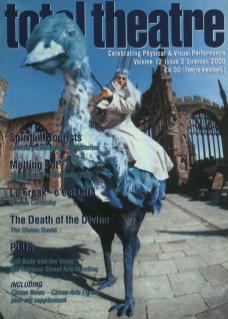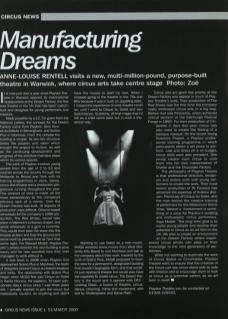It is now just over a year since Playbox Theatre in Warwick opened its international headquarters at the Dream Factory, the first ever theatre in the UK that has been custom built and designed for young performers and creators.
Made possible by a £2.7m grant from the National Lottery, the concept for the Dream Factory came from Playbox, Glen Howell Architects in Birmingham, and Scéno Plus in Montreal. From the outside the building is simple. Its box-like structure belies the passion and vision which brought the project to fruition, as well as the continuing development and progress of the activities that take place within its various spaces.
The work of Playbox involves young people from the age of 2 to 23 and extends across the country through the Midlands to Bristol and York with its training programmes in voice, dance, circus and theatre and a production programme running throughout the year. This amount of work is made all the more extraordinary by the company's previous lack of a home. Until the Dream Factory was built, all aspects of production were difficult. Ground-based rehearsals for the company's 1996 production, The Red Shoes, would take place in Warwick's Unitarian chapel, and aerial rehearsals at a gym in Coventry. They would then take the show into the theatre at 8am and fuse the ground and aerial work by preview time at 7pm that same night. For Stewart McGill, Playbox Theatre's artistic director, the new building is pure luxury and he now wonders how they ever managed to work without it.
It was back in 1996 when Playbox first approached Scéno Plus in Montreal, the team of designers behind Cirque du Soleil's theatres and tents. The relationship with Scéno Plus began when McGill first saw Cirque du Soleil in Santa Monica. He explains: 'I'd been passionate about circus since I was three years old. I actually wanted to join the circus but realistically couldn't do anything and didn't have the money to start my own. When I stopped going to the theatre in the 70s and 80s because it was in such an appalling state, I missed the experience of what theatre could be, until I went to Cirque du Soleil and saw Saltimbanco. Suddenly, all that magic that I'd felt as a child came back but in such a theatrical way.’
Wanting to use Soleil as a role model, McGill received some money from West Midlands Arts Board to visit Montreal and talk to the company about their work. Inspired by the work of Scéno Plus, McGill proposed to them the idea for a permanent, designated building that wouldn't segregate form, and that wouldn't just represent theatre but would also have the capability to create circus. The Dream Factory is the result and it opened with DF4 Looking Glass, a fusion of theatre, circus, dance, clowning, mime and movement, with text by Shakespeare and Sylvia Plath.
Circus arts are given top priority at the Dream Factory and appear in much of Playbox Theatre's work. Their production of The Red Shoes was the first time the company really embraced circus arts in a big way. Before that was Pinocchio, which achieved critical acclaim at the Edinburgh Festival Fringe in 1993. For their production of Cinderella in April this year, circus was also used to create the feeling of a baroque masque. On the recent Young Directors Project, a Playbox professional training programme in which participants select a set piece to perform, cast and direct on a nil budget, circus skills were also prevalent. One young creator even chose to work them into her own interpretation of Charlie and the Chocolate Factory.
The philosophy of Playbox Theatre is that professional directors, designers and writers work with young performers to create the work. Their most recent production of Dr Faustus has attracted the expertise of Andrew Watson. Previously of Cirque du Soleil, and the man behind the creative training of performers for the Millennium Dome show, Watson's involvement is something of a coup for Playbox's budding and enthusiastic circus performers. Says McGill: 'The long-term goal is to excite young people and develop their potential in circus as an artform in the UK. We plan to create an environment at the Dream Factory where experienced circus artists can pass on their knowledge to the next generation of performers.’
While not wanting to duplicate the work of Circus Space or Circomedia, Playbox Theatre want to ensure that the creators of the future can see circus stand side by side with theatre and to encourage them to look at circus as a potential career, as an artform in itself.

